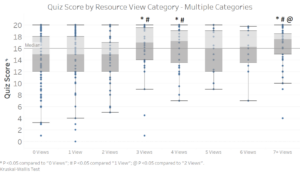Tingting Zhu
Course/ProgramGeography, Geomatics and Environment GGR278: Geographical Information Systems is an introduction to models of representation and management of geographical data for scientific analysis. Basic quantitative methods and techniques for geographic data analysis, including collection, manipulation, description and interpretation. Practical exercises using GIS and statistical software packages with examples drawn from both physical and human geography. |
Design Context
In this course, I set up alternating biweekly quizzes and biweekly discussion board. The discussion boards are designed in a way that students will exercise study skills such as drawing concept maps, designing questions according to bloom’s taxonomy, and reflecting on academic goals. I wanted to investigate whether providing students opportunities to exercise learning strategies in discussion board is effective in enhancing student engagement and performance.
Instructional Challenge
It is reported that many college-level students are ineffective learners (Kiewra, 2002). There are many study skill resources provided by universities’ academic centres that can help students learn. However, not all students visit the centres or utilize the resources. I would like to investigate whether embedding learning strategy instructions into the disciplinary context help students to be more effective learners.
Design Strategy
We collected the frequency of student views and participations in each discussion board and correlated them with student performance in the following week’s quiz.
We not only analyzed the binary groups (e.g., students viewed versus not-viewed; students participated versus not-participated) but also compared the effects of multiple views and participations (e.g., viewed 0, 1, 2, 3, 4, 5, 6, 7+; participated 0, 1, 2, 3, 4+)
Use of Data to Inform Design Iteration and Instruction
The results show that there are positive and significant correlations between the frequency of views of the discussion board and quiz score for 3 out of 5 quizzes. Similarly, there are positive and significant correlation between the frequency of participations in the discussion board and quiz scores for 3 out of 5 quizzes. In addition, students who accessed the discussion board before each quiz had a statistically higher quiz score compared to the ones that did not access this resource.
Interestingly, the higher number of views (>= 3) are associated with higher median quiz scores compared to fewer total views (<3); whereas participations at all levels are associated with a same level of improvement compared to 0 participations.
I plan to apply the instructional strategy of embedding study skills into more courses, and encourage students to comment on each other’s posts to increase their number of views.
Next Steps
There were five pairs of online discussion boards and quizzes that we investigated. Out of them, the pair #1, #4, and #5 showed positive and significant correlations between views and quiz scores, and the pair #1, #3 and #4 showed positive and significant correlations between participations and quiz scores.
My further question to be investigated include what factors contributed to some study skills (implemented in #2) that not positively correlate with student performance?
Another question is to investigate the factors contributed to the student better performance, whether it is the adoption of the study skills in the discussion board, or the student engagement, or simply because students who perform better are generally more engaged.

